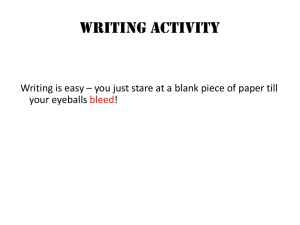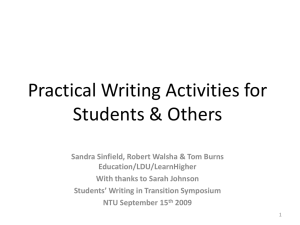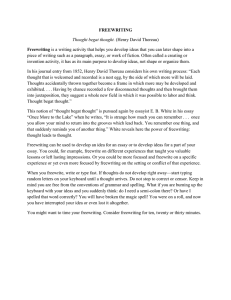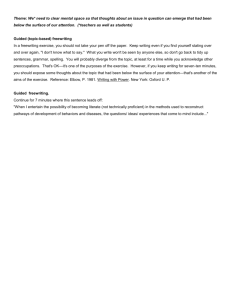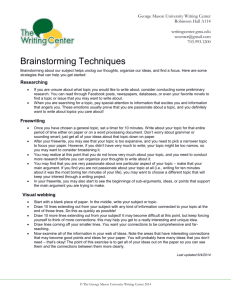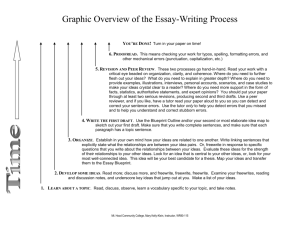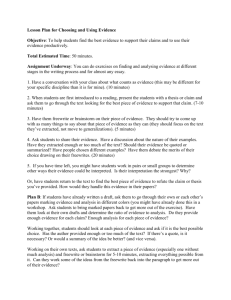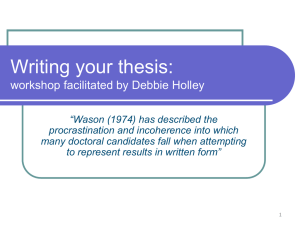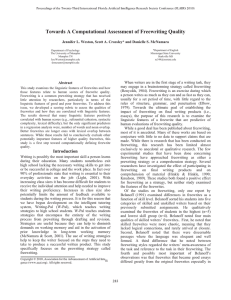Academic writing 2
advertisement
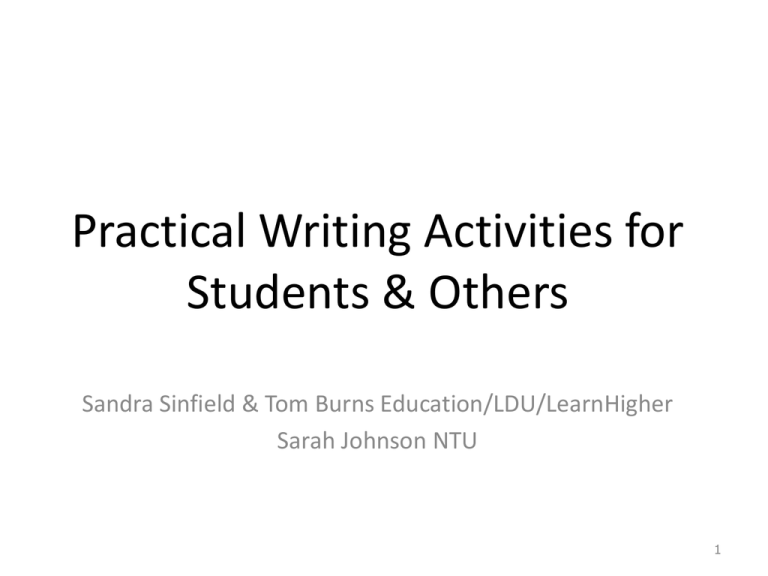
Practical Writing Activities for Students & Others Sandra Sinfield & Tom Burns Education/LDU/LearnHigher Sarah Johnson NTU 1 What is Academic Writing? 19/08/2009 2 Developing writing Students benefit from being given opportunities to: • Practise writing in the discipline • Reflect on their writing and other aspects of their learning • Reflect on feedback from their teachers 19/08/2009 3 To practise writing in the discipline EXCELLENT site for linking phrases and for WRITING: http://www.phrasebank.manchester.ac.uk/ 1 Freewriting • Peter Elbow (1998) argues that free-writing encourages students to write at length without fear of censorship. Benefits include: • Freedom to explore a topic • Demonstrates knowledge • Encourages understanding • Spelling & grammar (3 min): http://www.youtube.com/watch?v=LlL5W2qA0EA • On writing (9min): • http://www.youtube.com/watch?v=YDUn1c4uxUE 19/08/2009 5 Activities • The Path exercise follows: write for one minute on each topic; review elements of story across group; discuss impact of writing in this way… • Resources: • Stopwatch: http://www.onlinestopwatch.com/full-screen-stopwatch/ • Freewrite:http://www.cumquat.co.uk/freewrite / • http://www.writethink.co.uk/wordpress/wpcontent/fwt/Free_Write01.html 19/08/2009 6 The Path Path Tree House Water 19/08/2009 Key 7 Academic freewriting Use for: • Writing at length • Writing in discipline • Structure • Proof-reading • Editing • Reflecting What will you do with this information? How will it effect you as a student? Can you use this in your work setting? How? 20.10.09 -SFS 8 Freewriting & study: • Generic freewriting: • Freewrite for 5 minutes on previous experiences that will be useful to you on this course • Freewrite for 5 minutes on today’s class • Freewrite a definition of a term in 1 minute 19/08/2009 9 To reflect on writing and other aspects of learning See also http://www.arts.ac.uk/cetl/visual-directions/ 1 Reflective learning journal • Have you used a reflective learning journal? • Like the CLiP CETL one? • Use your journal as a space to reflect on your progress … & • Develop aspects of your thinking/writing. 19/08/2009 11 Suggested entries • Reflections on study sessions: what, why, reaction, learned, new goals … • Notes on readings • Questions relating to readings • Freewriting on a topic • Glossary of terms • Planning and drafting • Notes from the press… 19/08/2009 12 Development of the reflective learning journal • Supports student reflection on learning/reading • Promotes critical analysis • Encourages deep understanding through questioning • Can be creative & appealing 19/08/2009 13 Reflecting on THIS session • • • • What have we done? What activities have we undertaken? What resources have we used? Are these activities/resources which you would use? • Have you any further suggestions? • Make notes for yourself – and don’t forget to follow up good ideas. 19/08/2009 14 Writing resources • • Organise your DESK and your READING: http://learning.londonmet.ac.uk/TLTC/learnhigher/desk/desk.html • • Check out these writing resources: http://learning.londonmet.ac.uk/TLTC/connorj/WritingGroups/ • • Essay writing animation – Portsmouth: http://ondemand.port.ac.uk/central/One_way_to_write_an_essay.wmv • Essay/report quiz: http://learning.londonmet.ac.uk/LMBS/study/reports_essays/ • EXCELLENT site for linking phrases and for WRITING: http://www.phrasebank.manchester.ac.uk/ • • Our Preventing Plagiarism course – in WebLearn: http://learning.londonmet.ac.uk/TLTC/learnhigher/Plagiarism/ References • Calvin and Hobbes cartoon found at: http://www.benpfeiffer.net/blog/2008/04/ca lvin-hobbes.html [accessed 21/08/2009] • Thaiss C. and Zawacki T. M., 2006. Engaged Writers and Dynamic Disciplines: Research on the Academic Writing Life. Portsmouth: Boynton/Cook. 19/08/2009 16
